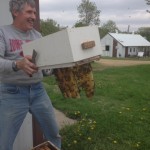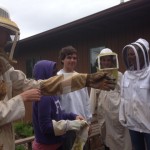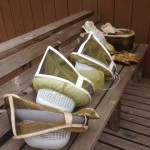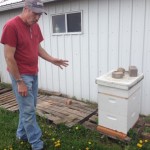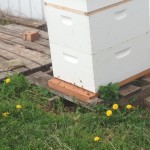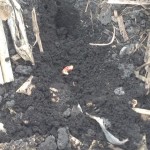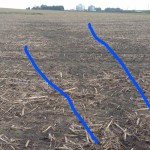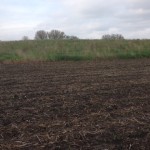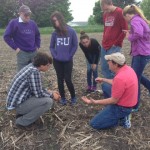In true farm fashion, our activities were determined by the weather, and our plans changed literally at the last minute. Since today was Sunday, everyone got to sleep in and/or go to church with Dr. HN. We had planned to go to see a guy named Mark Tintjer, a master beekeeper, a few miles down the road. Bees only come out when there is enough sunlight, so today’s dark overcast skies did not bode well. However, just as Dr. HN gave up hope on seeing the bees, Mark called and said, “So are you coming?”
I learned so much that I don’t even know where to begin! Well, I guess I should start off by saying beekeeping is a lot more complicated than I ever thought, granted I never actually thought too much about bee keeping. Keeping the colony healthy is all about understanding bee behavior, including keeping a balance between populations (or else, they’ll swarm away from your farm and create a new colony). Mark was amazing, and I was in awe of how much he knew. He said that he started by just reading a book, but a lot of it comes from on-the-job trial and error, like normal farming. His biggest problems come from neighboring farms spraying their pesticides or planting genetically-modified crops. The pesticides that are sprayed onto or are produced naturally by these plants ultimately poison the colonies. Bees will travel up to two miles to find good pollen, but when surrounded by pesticide-laden cornfields, there are very few alternatives.
Did you know that there basically is a “Big Bee” industry, just as there is Big Corn, Big Pork, etc. It makes a lot of sense because all of that supermarket honey has to come from somewhere, but, like I said, I never really thought about it. Especially in California, there are farms that have thousands of colonies to produce honey and even queen bees that keepers across the nation can purchase. To keep the bees healthy, the big farmers sprinkle antibiotics on the slats in the bee boxes for them to eat. However, just like everywhere else, the bacteria is evolving, and keepers are trying to find new antibiotics to keep them at bay. We also do not see quite the same regulatory battles as other parts of the food industry because, unlike other foods, honey cannot spoil. The only way honey can become a public health hazard is if the keeper puts something in the honey. By the way, bees produce a lot of honey, if you didn’t already know. Out of Mark’s less-than-twenty colonies, he produced two and a half tons in one year. The past two years have been especially good because of the dry summer weather, which Mark noted produces more pollen and less water for the bees.
I know I am leaving out a bunch of information, but I think it would be a good thing for you, readers, to do some homework about bees. They do wonders for your gardens and are fascinating creatures. You can order them online; queens typically cost between $20 and $30.
(P.S. The larva aren’t too bad, either. All of us ate live ones, and they pretty much tasted like mushrooms.)
- What happens when you don’t put in a slat.
- Gearing up!
- All that stands between life and death.
- Mark giving us the rundown.
- Your standard colony box.
We then went to visit Glen Hodnefield, one of Dr. HN’s high school friends, who is a devotée of no-till farming and other conservation practices. He described his philosophy by saying, “Soil is your factory. You can’t replace it, so you certainly don’t want to lose it.” Some of his farm ground includes highly-erodable land, or “HEL,” and is required to have a conservation plan before receiving subsidized crop insurance. One part of the plan modifies the amount of tillage allowed on the field, including reduced and none. No-till farming is when you leave the previous year’s leftover stalks and leaves (what he called “residue”) to slowly decompose, yet also holding the soil in place and retaining the nutrients. There is no need to plow up the land. However, he also participates in a variation of no-till, which is strip-till farming. Here, you clear out rows where you will plant the seeds and apply the appropriate fertilizer and pesticides. Corn plants need this more than soy beans because they need more room to grow. Glen is also a fan of not allowing chemicals to get into waterways. Therefore, he plants grass waterways that directs water away from roads and streams and buffer strips around waterways that help slowly filter out nutrients.
I believe Hedley asked a really good question when she said, “Why wouldn’t farmers want to voluntarily do these things?” Glen said it was largely because people like tradition. This is the historical way, proven and true. Farmers like the big machines because it makes them feel the most productive and possible. Therefore, they must be shown that these practices can be just as profitable, without the risks to the environment and with smaller machines.
- The little bean that could.
- You can see the erosion here between the blue lines. The good thing about no-till is that the water only swept away the debris, not the soil!
- The dark lines (with the plant buds) are where the residue has been scraped away.
- Glen explaining how you plant with strip-till.

